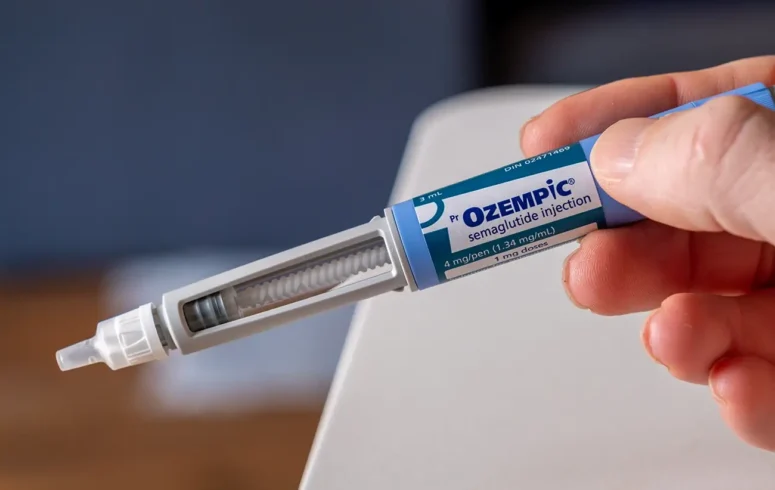Ozempic
Helping Affected Patients Pursue Legal Action to Seek Compensation for Injuries Associated With the Medication, Ozempic.
Contact Simon Law to schedule your free case evaluation.
Ozempic Injury Litigation Attorneys at Simon Law
At Simon Law, we represent individuals who have suffered adverse effects from using Ozempic, a medication primarily prescribed for type 2 diabetes and off-label weight management. If you have experienced health complications or severe side effects from using Ozempic, our experienced attorneys are here to provide you with dedicated legal representation. We have a deep understanding of pharmaceutical litigation and a proven track record of handling complex cases involving dangerous drugs, offering comprehensive legal support. Our team will investigate the details of your case as well as pursue compensation for medical expenses, lost wages, pain and suffering, and more. Simon Law is committed to advocating for your rights and achieving justice for those harmed by dangerous medications.

About Ozempic
Ozempic (semaglutide) is a glucagon-like peptide-1 (GLP-1) receptor agonist that helps regulate blood sugar levels in adults with type 2 diabetes. It has also gained attention for its off-label use in weight management. However, there have been growing concerns about its safety, with reports of severe side effects leading to numerous lawsuits.
Common allegations in Ozempic-related litigation include claims that the drug caused serious health issues such as pancreatitis, thyroid tumors, kidney damage, and gastrointestinal problems. Plaintiffs argue that the manufacturer, Novo Nordisk, failed to adequately warn patients and healthcare providers about these risks. As a result, individuals who have suffered harm after using Ozempic are pursuing legal action to seek compensation for their injuries.
What Are The Main Issues Associated With Ozempic?
The main issues associated with Ozempic include:
- Pancreatitis: Some users have reported developing pancreatitis, a potentially life-threatening inflammation of the pancreas. Symptoms include severe abdominal pain, nausea, and vomiting.
- Thyroid tumors: There bave been concerns about an increased risk of thyroid tumors, including medullary thyroid carcinoma, in patients using GLP-1 receptor agonists like Ozempic.
- Kidney damage: Reports have suggested that Ozempic may contribute to kidney problems, particularly in individuals with pre-existing conditions.
- Gastrointestinal issues: Common side effects include nausea, diarrhea, and vomiting. In some cases, these issues can be severe and lead to dehydration or other complications.
What Evidence Is Needed To Support An Ozempic Lawsuit?
To support an Ozempic lawsuit, the following types of evidence are typically required:
- Medical records: Comprehensive medical records are crucial, as they document the use of Ozempic, the diagnosis of any related injuries or complications, and subsequent treatments. These records should include prescriptions, dosage details, and any noted side effects or adverse reactions.
- Injury documentation: Detailed documentation of the injuries or conditions allegedly caused by Ozempic, such as pancreatitis, thyroid tumors, kidney damage, or severe gastrointestinal issues. This may include diagnostic tests, imaging results, and physician notes.
- Proof of causation: Evidence demonstrating a direct link between the use of Ozempic and the injuries sustained. This could involve medical expert testimony or scientific studies supporting the connection between the drug and the reported side effects.
- History of warnings and communication: Any warnings or lack thereof provided by the manufacturer, as well as communication with healthcare providers regarding the risks associated with Ozempic. This may include drug labels, patient information leaflets, and correspondence with medical professionals.
- Financial documentation: Records of medical expenses, lost wages, and other financial losses incurred due to the injuries. This includes bills, receipts, pay stubs, and any other evidence of economic impact.
- Personal testimonies and impact statements: Personal accounts of the physical and emotional impact of the injuries on the patient’s life. This can help establish the extent of pain and suffering and the overall effect on the quality of life.
- Expert opinions: Testimony from medical experts who can provide insight into the safety profile of Ozempic, potential side effects, and whether the manufacturer met the standard of care in warning about these risks.
This evidence collectively helps build a strong case by demonstrating the drug’s harmful effects, the failure of the manufacturer to provide adequate warnings, and the resulting damages suffered by the patient.
Can I File A Lawsuit If I Used Ozempic Off-Label For Weight Loss?
Yes, you may be able to file a lawsuit if you used Ozempic off-label for weight loss and experienced adverse effects. However, several factors will influence the viability of your case:
- Off-label use: Ozempic is approved by the FDA for managing type 2 diabetes. Using it off-label for weight loss, although not officially approved, is a practice some doctors may endorse. The key issue in a lawsuit would be whether the drug’s use for weight loss was adequately disclosed to you, and whether the potential risks were communicated.
- Informed consent: If you were not properly informed about the risks associated with using Ozempic off-label, you might have a claim based on lack of informed consent. This means that your healthcare provider should have explained the potential risks and benefits before prescribing the medication for weight loss.
- Adverse effects: To pursue a legal claim, you would need to demonstrate that you experienced specific adverse effects that were directly related to the off-label use of Ozempic. Medical evidence and documentation will be crucial in establishing a connection between your symptoms and the medication.
- Manufacturer liability: While drug manufacturers are not responsible for off-label uses, they can be held accountable if they failed to provide adequate warnings about known risks associated with the drug. If it can be proven that the manufacturer was aware of these risks and did not adequately warn users, you might have grounds for a lawsuit.
- Legal consultation: It’s essential to consult with a legal professional who specializes in pharmaceutical litigation. They can evaluate the specifics of your case, including your medical history, the nature of the adverse effects, and any potential breaches in duty by your healthcare provider or the manufacturer.
If you believe that using Ozempic off-label for weight loss has led to significant health issues, seeking legal advice is the best way to understand your options and determine if you have a case.
What Compensation Can I Seek In An Ozempic Lawsuit?
In an Ozempic lawsuit, the compensation you may seek depends on various factors related to your case. Here are the types of damages you might pursue:
- Medical expenses: You can seek compensation for past and future medical expenses related to the adverse effects caused by Ozempic. This includes costs for treatment, hospital stays, medication, and any necessary medical procedures.
- Lost wages: If the side effects of Ozempic have impacted your ability to work, you may be entitled to compensation for lost wages. This includes income you lost during your recovery and any future earning potential affected by your condition.
- Pain and suffering: Compensation for pain and suffering addresses the physical pain and emotional distress you experienced due to the adverse effects of the drug. This is a subjective measure of the impact on your quality of life and wellbeing.
- Loss of enjoyment of life: If your conditions has significantly impacted your ability to engage in daily activities and enjoy life, you may be eligible for loss of enjoyment of life.
- Permanent disability: If the adverse effects have resulted in permanent disability or long-term health issues, you might seek compensation for the ongoing impact on your life and ability to function.
- Punitive damages: In some cases, you might be able to pursue punitive damages if it is proven that the drug manufacturer acted with gross negligence or malicious intent. These damages are meant to punish the wrongdoer and deter similar conduct in the future.
- Legal fees and costs: You may also seek reimbursement for legal fees and other costs incurred while pursuing your lawsuit.
To determine the appropriate amount of compensation for your specific situation, it’s crucial to work with an experienced attorney who can evaluate your case, gather evidence, and advocate on your behalf. They can help ensure that all relevant damages are considered and that you receive fair compensation for the harm you have suffered.
Meet Our Dedicated Team of Attorneys
When you need qualified and reliable guidance, you know where to turn. Simon Law is ready to listen to your story and review the complex aspects of your case.



Contact Our Firm Today
Our mission is to provide the highest-quality legal services with integrity, professionalism, and respect for our clients. Simon Law has the resources and expertise to handle your case without sacrificing the personalized counsel and support you deserve.